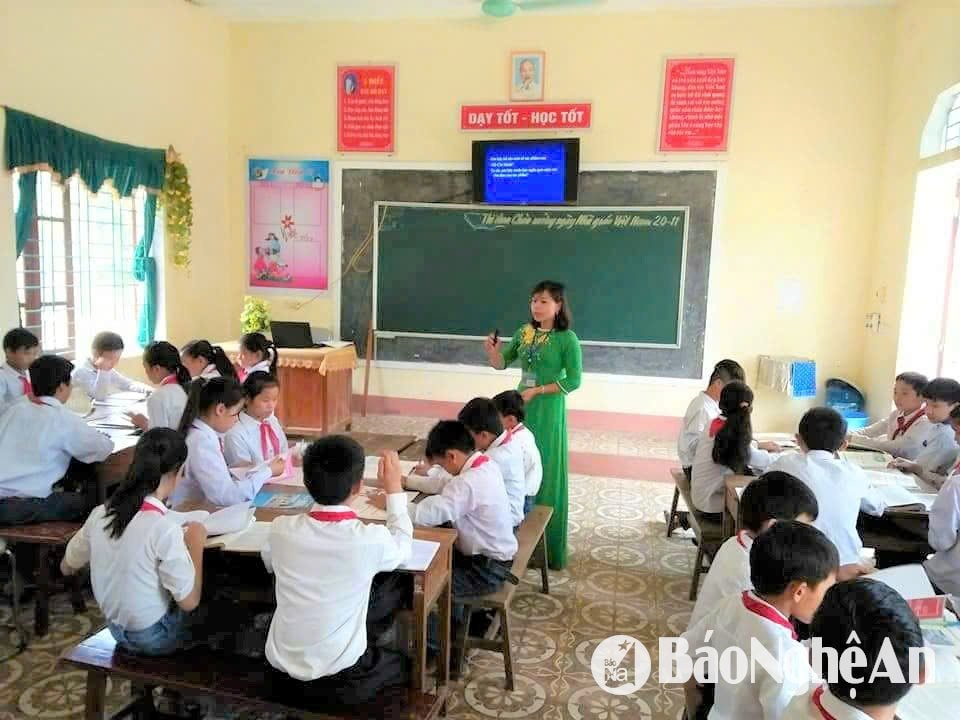Removing difficulties in implementing enhanced teaching and learning for mountainous boarding schools
From the 2024-2025 school year, 85 primary, secondary and high schools for ethnic minority boarding students across the province will be funded to implement enhanced classes on English, IT, life skills and STEM education.
On the morning of February 17, the Department of Education and Training held a workshop to remove difficulties and obstacles in implementing Resolution No. 17/2024/NQ-HDND dated August 19, 2024 of the Provincial People's Council at educational institutions.
Enhancing skills for students in mountainous areas
Previously, on August 19, 2024, the Provincial People's Council issued Resolution No. 17/2024/NQ-HDND stipulating a number of policies to support ethnic minority boarding schools and high schools to pilot the ethnic minority boarding school model in ethnic minority and mountainous areas in Nghe An province.
Pursuant to this Resolution, 83 primary and secondary boarding schools for ethnic minorities in the districts of Ky Son, Tuong Duong, Con Cuong, Que Phong, Quy Chau and 2 high schools selected to build a new model of boarding schools, Que Phong High School and Ky Son High School, will be supported with funding to enhance teaching of Foreign Languages, Information Technology, STEM education, life skills and life values.
.jpg)
The Resolution also stipulates support through educational institutions to pay for staff, teachers, and those involved in teaching and educating students, support funding for purchasing textbooks, and build shared bookcases to lend each student a set of books corresponding to each class they are attending.
The implementation of the Resolution has practical significance with the goal of supporting boarding schools across the province to implement enhanced lessons, helping students have the opportunity to comprehensively develop skills in Foreign Languages, Information Technology, and life skills. At the same time, supporting part of the funding for teachers directly teaching classes, creating motivation for teachers to make efforts and contribute.
.jpg)
To implement this Resolution, recently, the Provincial People's Committee has also issued instructions, requiring the Department of Education and Training, local authorities, and schools to develop plans, estimate costs, and effectively implement life skills and life values education to meet the requirements of improving the quality of education.
Removing obstacles
On the local side, according to reports, some schools have implemented enhanced teaching and learning in many forms, either directly or online. However, through the implementation process, there are still difficulties, such as inadequate facilities, lack of teaching equipment or equipment that has degraded and does not meet the requirements for teaching STEM, Foreign Languages, and Information Technology (especially in remote schools), and lack of teachers (especially English and Information Technology teachers).
In some places, the teachers' qualifications do not meet the requirements of the program, especially primary school teachers. Some schools are having to arrange cultural teachers (who have been trained) to teach IT. STEM teachers and life skills teachers have not received formal training, mainly part-time teachers, teachers with single-subject training are arranged to teach STEM, so it is difficult to teach integrated and interdisciplinary subjects.
.jpg)
Due to the lack of textbooks and enhanced teaching materials, schools are currently having difficulty in developing programs; planning mainly follows the Department's curriculum framework, without textbooks or materials to guide specific content.
With the aim of removing difficulties and obstacles, at the workshop, representatives of schools and departments of education and training frankly pointed out the shortcomings and inadequacies in the implementation process and proposed solutions to help schools implement effectively soon.
Speaking at the workshop, Deputy Director of the Department of Education and Training Dao Cong Loi affirmed that Resolution 17 is one of the policies with practical significance for mountainous districts. That also shows the province's attention and priority for schools in difficult areas with the goal of improving the quality of education and shortening the gap between regions. In the contextCircular 29, the implementation of Resolution 17 has practical significance, helping schools to conveniently implement teaching 2 sessions/1 day, creating opportunities for students to study additional subjects outside of regular school hours.

The leaders of the Department of Education and Training also shared the difficulties and obstacles of schools in the implementation process. With the spirit of initiative, flexibility and creativity, in the coming time, the Department recommends that schools organize teaching and learning according to the actual conditions in the schools, initially only implementing with some students at the beginning of the school year to have a long-term evaluation process.
With difficulties in facilities and teaching staff, the Education sector suggests that schools can increase online teaching and connect with other schools in the locality to share resources and human resources. The Department will strengthen connections with schools, especially lowland schools, to support and help each other. The sector will also increase training for teachers to improve their capacity and teach interdisciplinary subjects. In addition, schools are encouraged to organize teaching with recycled materials, arrange appropriate topics and lessons to help develop students' capacity according to the set goals./.
